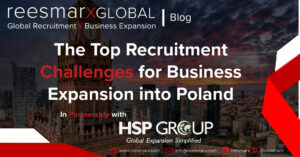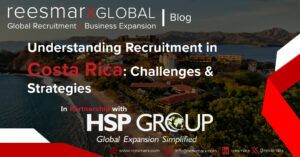EuroDev and reesmarx work in tandem to provide quality global recruitment and resourcing services in developed and emerging markets. Contact us to learn more about comprehensive support for strategic expansion from the United States to overseas locations.
We are pleased to introduce one of our strategic partners, providing global expansion services to businesses who wish to enter European markets from the United States. For the reesmarx blog, we asked five questions with Sten Bruggert Marketing Manager, and EuroDev CEO, Mark de Vries.
When was EuroDev founded, and what is the core mission of your group?
“Established more than twenty years ago, EuroDev has helped over two hundred American companies expand overseas into new markets. Our core service is business development, supporting businesses that want to grow into the next stage strategically. Some of our client portfolio work has included retail and healthcare verticals, helping businesses with organic sales growth and market penetration. From zero sales to multi million-dollar growth in Europe, our team has earned international recognition for providing results.
- Serving clients in 11 languages.
- A network of 120 European colleagues and experts.
- A performance based portfolio of over 250 clients in the past twenty years.
The core mission for EuroDev is to be the European business development partner for mid-sized North American companies. The scope of our relationship with our clients is one of transparency and trust, and we assist businesses with gross annual revenues of ten to several hundred million dollars. Our team is comprised of experienced leaders who have studied, lived and worked in the United States. Because of this intimate understanding of the American culture and business practices, combined with extensive experience in a variety of emerging and developed European markets, we offer successful international support, including mergers and acquisitions.”
What are some of the advantages that American based brands and corporations realize by branching out and expanding overseas? What type of industries are rapidly expanding?
“The principle of exporting is important to understand. Why should businesses export from the United States to other countries? Research shows that exporting North American mid-sized companies over a five-year period, trend at a profitability rate that is higher than businesses who remain within their domestic territory only. Non-exporting companies average growth of under 7%, whereas international organizations see double digit growth, doubling or tripling domestic revenue.
American businesses who export and expand over seas, tend to be more innovative and invest and benefit from product development. This innovation is impacted by the exposure they have to other markets, cultures and best practices from emerging markets and international competition. Risk diversification and tolerance improves. Exporting entities and businesses who operate at the international level also perform better competitively within their own domestic market. So what you see is that from a performance perspective, there is a lot to be gained by organizations who expand globally.
On average, sales grow, costs decline, innovation grows and the structure of the company grows exponentially, making it stronger and more resilient. Part of the growth and strength component also involves the ability to be able to recruit top level talent, as high-performing career professionals prefer businesses who are global. Despite the changes worldwide to more protectionist or market central policies politically, businesses and brands persevere, and the trend of global expansion shows no sign of slowing. Exporting (which is a current focus in America) improves wealth and opportunity domestically for U.S. based organizations, and business is persistent.”
What are the top three countries and markets are EU based businesses most interested in penetrating? In your experience, why are these countries favored for international expansion?
- United Kingdom (easiest in terms of culture and language to expand into, and provides a gateway and steppingstone to Europe).
- France
- Germany
- Benelux (offers ease of entry and a good place to study expansion strategy for other European countries).
- Poland and Turkey (sleeping giants that are quietly growing and rapidly recruiting new foreign business investment).
Many American businesses have some apprehension about being accepted in foreign countries. We remind U.S. clients that overall, American owned businesses are highly favored around the world and respected, particularly those who are pursuing global expansion.
What are some of the obstacles and challenges businesses face when planning and executing a global expansion strategy?
- Finding trustworthy and competent regional partners.
- Payment security.
- Law and government regulations.
- Accessing accurate market intelligence.
- Communication and language.
- Culture and ethnicity.
- Supply chain establishment and management.
- Measurement systems (imperial vs. metric).
“Language and cultural differences naturally present a formidable obstacle for American mid-sized companies that are looking to expand overseas. The assumption that the same model will work successfully in a new geographic region contributes to failure for large and small brands. Some recent examples include Target U.S.A. and it’s failed expansion into Canada. But successful examples of culture centric expansion strategies is the retail grocery chain, Aldi (from Germany). The grocery store is a luxury high-end store in some markets, and a very economical, budget friendly store in others, depending on consumer expectations and needs. The brand never assumes any two markets are the same, and creates a tailored brand identity for consumers on a region by region basis. Walmart launched an unsuccessful bid at expansion in Germany, due to cultural differences; culture matters.”
What advice would you have for brands who are at the strategic planning stage, with the intention to expand overseas?
“Get real information, and get real experience on board. There is a lot to learn, so take the opportunity to talk to people who have moved businesses from America to Europe successfully. Remember to manage expectations; if it took twenty-years to grow your business domestically, it’s not reasonable to expect the same level of performance within three months in a European market. Do your research.”
Learn more about EuroDev and contact us to access resources to help your business develop a successful strategic global growth plan.






